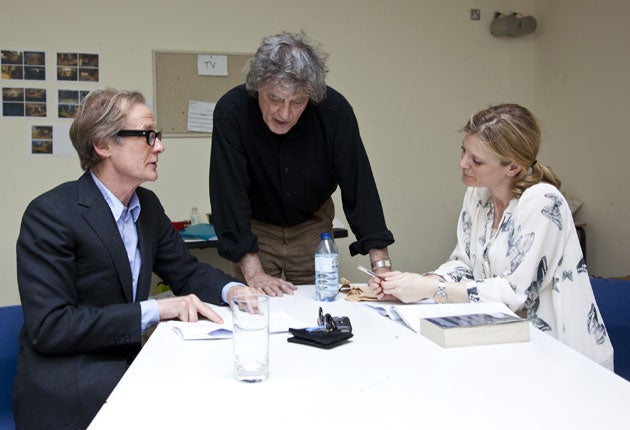New Tom Stoppard play shines light on torture in the name of freedom
Latest work by Britain's leading dramatist targets rights abuses of 'War on Terror'

On the top floor of the Royal Court Theatre in London's Sloane Square, a frantic rehearsal is underway for a rather unusual play. In one corner of the brightly lit room sits Sir Tom Stoppard, unmistakable with his grey bouffant and eagle eyes darting between a heavily annotated script and the two actors in front of him.
The acting talent, Bill Nighy and Emilia Fox, have just two short rehearsals to nail their scene before the curtains come up and time is tight. All of a sudden Sir Tom brings proceedings to a brief halt courtesy of Chelsea and Westminster's army of notoriously zealous traffic wardens
"This is terribly embarrassing," he says, apologetically. "I've just realised that the parking meter is about to run out and I need to move my car. I can't just put more money in, they do you for that."
It's a brief moment of light relief in an otherwise tense day. Most theatres would rehearse a new production for weeks before putting on a performance. This particular cast and crew has just a weekend. Time is tight because the logistics of the play involve getting together an ensemble cast to work for free in the name of charity.
The play itself, The Laws of War, is a one-off 90-minute production to celebrate the work of Human Rights Watch and went on show for the first time last night. It has been written by a total of nine scribes and stars 13 luminaries of the acting world. The list of those involved is impressive. On the writing side there is Jack Thorne, who has scripted episodes for Skins and Shameless, Israeli author David Grossman, and playwright Rebecca Lenkiewicz, to name just three. Acting talent includes recognisable faces such as James Nesbitt, Nitin Ganatra, Kenneth Cranham and Claire Skinner.
Each of the play's scenes cover various aspects of Human Rights Watch's work, from visiting prisoners of conscience in the jails of far-away despots, to fighting legal battles against the creeping erosion of civil liberties in our own back yard.
Stoppard's scene deals with torture, or "Pizza" as Nighy's character, an arrogant military figure in charge of a shady black site prison, insists on calling it.
"Persuasion and Interrogation Techniques (Approved)," the officer tells an earnest and increasingly terrified human rights lawyer played by Fox. "We go strictly by the book here ... stress positions, isolation, no sleep, no dark, loudspeakers, no light, sweat-box, Arctic conditions, Arctic Monkeys, German shepherd, mock execution, pissed pants and everybody's favourite, the Americana con Pellegrino, which is not waving but drowning ... The whole pizzeria."
For Stoppard, who has had a long association with human rights groups, describing a list of torture techniques with a seemingly harmless acronym such as "P.I.Z.Z.A." seemed like the kind of thing militaries and governments do nowadays.
"It just seemed plausible," he says, after rehearsals have come to an end. "There's no [Pizza] list as far as I'm aware. But of course there are lists, regulations and no-go areas in the way people under arrest are treated, whether it's military or civilian. One of the things which is constantly going on – and one doesn't know how bad or how widespread it all is – is that the regulations are bent and flexible."
A decade ago, he says, he would probably have set such a scene in some distant land. But after nearly a decade of the so-called "War on Terror", with its renditions, black sites, and Guantanamo Bays, torture feels a little closer to home.
"One always likes to think that other countries are not like one's own," he explains. "But there have always been people who think that what this country needs is a good healthy spell of military dictatorship. Much of this is about situations that are normally associated with foreign countries actually happening here. It's not the first time anyone's thought of that but it's a good way to approach it. So I slightly whimsically put in English place names and so on."
For Human Rights Watch the play is part-fundraiser and partly a way of getting a message out to the corridors of power as a new government takes over.
When they were in opposition, both the Liberal Democrats and the Conservatives made frequent noises about the erosion of civil liberties in Britain and our complicity in the rendition and torture of terror suspects. Now, says Tom Porteous, London director of HRW, it's time for the Government to turn oppositional statements into concrete action.
"The two parties in power have indicated they are in substantial agreement on civil liberties," he says. "They should translate that into practice by making a clean break with the previous government's abusive approach to counterterrorism and by strengthening the UK's role in bringing to justice those responsible for international crimes at home and abroad."
Subscribe to Independent Premium to bookmark this article
Want to bookmark your favourite articles and stories to read or reference later? Start your Independent Premium subscription today.

Join our commenting forum
Join thought-provoking conversations, follow other Independent readers and see their replies